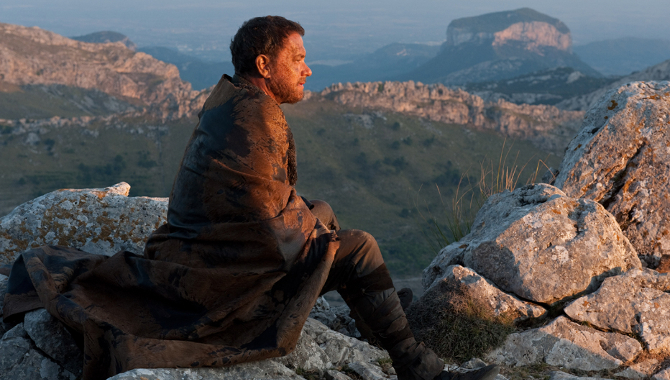film review: Cloud Atlas (2013)
No Comment
If you’ve read my Cloud Atlas clips and trailers post, you’ll already know why I had high hopes for this. Well, not high hopes exactly, but why I was eagerly anticipting its release…
I was looking forward to this because I’m tired of Hollywood making the safe bet.
I’m tired of the endless and unimaginative sequels and prequels, where the exact same thing happens, just on a different day, in a different place. I’m tired of not caring if a film will be good, because I know it’ll probably have enough explosions and one-liners to get by. I’m tired of the lack of ambition in our cineplexes.
Which is why something like the Jameson Dublin International Film Festival (JDIFF) is great. It’s not like some films festivals, who are out to showcase films to be picked up for distribution. With no sales element to the festival, it’s free to show all small, low budget, independent, ambitious films that will probably never get a release in Ireland outside of the festival, and even if they did they’d probably last a week in one of the arthouse screens and that’ll be it.
But what’s this got to do with Cloud Atlas? Not much, except that I saw it during JDIFF and it really struck me as a huge version of the rest of the films that were screening. Despite the big name cast and the distribution deal with Warner Bros, this isn’t a Hollywood production. With a final reported budget of $102 million, Cloud Atlas is in fact one of the most expensive independent films of all time.
It nearly got nixed more than a few times. The original novel, Cloud Atlas by David Mitchell, had been called unfilmable by many… I don’t know if I’d call it challenging, but it’s definitely… complicated. You’d have to wonder if their desire to film it was in some way centred around how difficult it would appear to be. In any case, somehow the Wachowskis and Tykwer managed to see it through. With much thanks apparently due to Tom Hanks. I always knew he was a good guy.
The big question of course is… How did they do?
In my opinion (obviously, since this is my website) Cloud Atlas is an unmitigated triumph. The film is everything I had hoped it would be, it’s ambitious, it’s un-pandering, it’s un-neutered by studio interference, it’s a soaring and epic story and it revels in it. But about half an hour into it, once it had somewhat settled, I thought to myself – People are going to hate this.
It’s not really that it’s challenging, as in hard to understand, it’s more that it’s demanding. It demands your attention and it demands that you keep up. I had read part of the book, about a third, so I had a fair idea of how it was organised. Knowing that helps but you have to want to go with it. If you don’t buy into the structure you may as well go home. You’re going to hate it.
Basically, Cloud Atlas is a multi strand narrative set across six generations. Not generations of a family, just generations. In the book the stories are only split in two so you get a good chunk of time to meet the characters… In the film, not so much.
The stories are pulled apart and woven together over the course of 3 hours to create a film that is so much greater than the sum of its parts. The stories themselves are interesting curios, trifiling tales, but they belie grandiose, universal themes that in some films would appear pretentious at best, naff if you were less generous.
This is Cloud Atlas’s triumph. It truly is epic. It looks beautiful, every detail of the different generations are realised. It demands that you keep up but it doesn’t make this too difficult. The characters are clear and the short cuts they take by creating distinctly different looks for the generations – by placing them in different film genres – and distinctly similar looks for the people are inspired.
Of course when I say “distinctly similar”, they are actually played by the same people. Prothetics transform Tom Hanks, Halle Berry, Doona Bae, Jim Sturgess, Ben Whishaw and others from different ages to different races all through the film. To varying degrees of success I must mention. If there is a technical flaw in the film it’s that some of the make up… well… it could be better. Poor Hugo Weaving suffers particularly.
Aside from the make-up, I find it difficult to criticise the film because I do think it deserves to be championed. Cinema needs to take more risks, and this is certainly a risky picture. I haven’t even mentioned yet that it’s the best sci-fi I’ve seen in years – my favourite genre has been over-run by aliens and giant robots recently… it’s as though people think that the sci-fi is in the spaceships, not the ideas. But that’s a whole different rant…
If I had to pull Cloud Atlas up on something (aside from the make up) is that it’s perhaps a little over reliant on its short cuts, on it’s visual cues. Now ok, it’s a film, so it’s not necessarily fair to criticise that it uses its medium – but I do think that it’s chopped down the stories a bit too much. The individual stories in the books have more to say than we get to see here.
Of course that just means that I’m looking for a 4 hour cut. I suspect it was hard enough to get it into cinemas at 3 hours. 4 hours, well that’s just madness. It means you won’t have time to show a film that’ll actually make money.
The saddest thing in all of this is that things like the run time -are- more important than story-telling and ambition these days. Movies cost so much money to make – and for people to go and see – that the most efficient way to make money becomes the best film to make. We see the same films made over and over again – Paranormal Activity I’m looking at you – because it worked the last time and in turn, people don’t take a risk in their choices because you can’t waste that hard earned €11 on a film you might not like.
It’s a vicious spiral and no-one’s winning.
If you haven’t seen Cloud Atlas give it a go. You might not like it, but at the least you can admire a group of people who decided to make a big budget film that was different.
9/10







No Comments